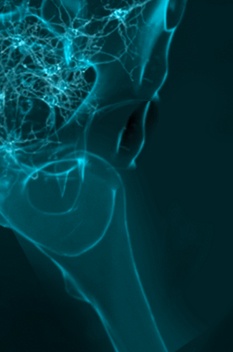Introduction
Peripheral nerve tumors can occur anywhere in the body. Most of them aren't cancerous ...
Highly specialized pelvic surgery
Anyone who suffers from a tumor in the sacral region, the coccyx or the pelvic nerves, understands that the removal of such tumors poses a particular challenge to the surgeon. We are well aware of the fact that this knowledge increases the concerns of patients about their own wellbeing. Laparoscopy is a gentle surgical procedure that provides a high degree of reliability. The Possover International Medical Center is the only center worldwide that performs laparoscopically assisted orthopedic surgery of the pelvic bone and nerve tumors.
Orthopaedic Surgery using Laparoscopy
The primary treatment for sacral tumors comprises the complete surgical removal (resection) of the tumor-like formations with large tumor-free margins and functional reconstruction.
In cases where the tumour has settled in the upper part of the sacrum, such a surgical intervention poses a particular challenge in sacral tumor surgery. The main reason for this being the difficulty in accessing the surgical area. In addition, the procedure involves a greater risk of bleeding during and after the operation, due to the increased blood supply to the tumor. A further risk is the injury of the adjacent nerves and organs, such as the ureter and rectum.
Tumors forming on the pelvic bones also include teratomas, osteochondro-sarcoma and others.
Tumors of the sacrum and coccyx: increased safety thanks to laparoscopic procedures
The treatment of tumors affecting both the sacrum and coccyx - so-called sacrococcygeal tumors - requires the removal of the affected parts of the sacrum and coccyx. This operation is performed by orthopaedic oncologists. The primary laparoscopic access to the pelvis, i.e. the use of an instrument with a tiny camera and light, enables precise visualization of the ureter, rectum and pelvic nerves. This visualization helps the surgeon to avoid injuries during the procedure. Furthermore, all pelvic blood vessels that supply the tumor can be sealed laparoscopically, preventing massive blood loss during the procedure. At the same time, the tumor can be removed with precision using adapted tumor-free resection margins.
Schwannoma: benign tumors also require removal
Schwannomas are benign and usually slow-growing tumors of the peripheral nervous system that develop from the Schwann cells. It is the task of the Schwann cells to coat the nerve fibres.
Schwannomas do not necessarily impair nerve function, but lead to deformation and compression of the nerve fibre bundles with increasing growth of the tumor. This development can result in neuropathic pain of the sciatic nerve, the vulva, the coccyx or the pubic bone. In the most severe cases, the affected nerves are then paralyzed.
Surgical investigation (exploration) and the removal of Schwannomas is absolutely essential. This procedure must be performed in order to histologically verify the benignity of the tumor. Malignant degeneration of Schwannomas is extremely rare, but can still occasionally occur.
Minimally invasive removal with laparoscopy
The surgical removal of schwannomas poses a particular challenge to the surgeon, as their anatomical position makes access difficult. Due to the extremely good blood supply in the pelvis, such an operation is associated with a high risk of bleeding during or after the procedure. The surgical treatment of such tumors within the pelvis is highly invasive in classical neurosurgery because the pelvic bone usually has to be removed in order to gain access to the tumor.
By using laparoscopy, the tumour can be reached from the front without removing the pelvic bone. Special rod lens optics (rigid endoscopes) are inserted through small openings in the abdominal wall created by the surgeon. This procedure - laparoscopic exploration - allows a minimally invasive approach that permits both complete removal and histological confirmation of the tumor. In addition, intraoperative blood loss is reduced because the camera can monitor the blood supply to the tumor.
Visual identification of the rectum, ureter and pelvic nerves is safer and much simpler with laparoscopic surgery than with conventional neurosurgery, where the pelvic bone has to be removed. In most patients with nerve root schwannomas, laparoscopic surgery improves symptoms. A postoperative deterioration is not to be expected, as the sacral nerve roots are spared.
The Possover International Medical Center is the only center worldwide that performs laparoscopic-assisted orthopedic surgery on pelvic bone and nerve tumors.
To help people in difficult situations to improve their quality of life has become his life's passion. Continuous research, decades of clinical experience and the focused determination to find a solution for previously unsolved medical problems, have enabled Prof. Possover to help often quite discouraged patients find release from their seemingly insurmountable problems.
Our team will take care of you
We will dedicate our expertise and know-how to help you find the solution that is right for you.
„As a cheerful, open and communicative person, I really appreciate coming into contact with people from all over the world. The well-being of others is very important to me.“

Neuropelveology is a medical discipline developed by Prof. Possover. It is based on the discovery of the pelvic nerves and includes the diagnosis of the diseases of these nerves by means of gynaecological examination methods and their treatment by means of laparoscopy.
Read morePeripheral nerve tumors can occur anywhere in the body. Most of them aren't cancerous ...
Vulvodynia is a chronic pain syndrome affecting respectively the vulva and occurs ...
Klausstrasse 4
CH - 8008 Zürich
Switzerland
E-Mail: mail@possover.com
Tel.: +41 44 520 36 00